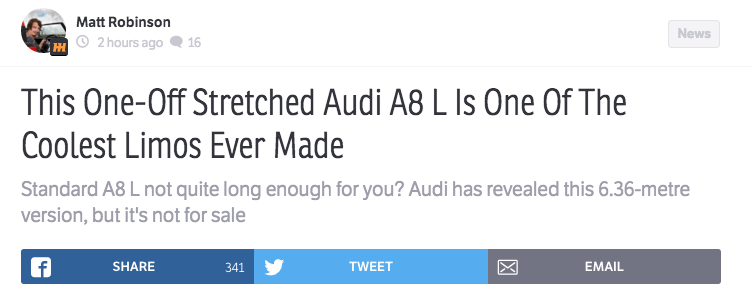Secure your place at the Digiday Media Buying Summit in Nashville, March 2-4
A UK auto publisher’s pageviews fell by 16 percent in a Facebook Instant Articles test

As Facebook rolls out Instant Articles to all publishers, those who have been testing the feature for close to a year say it’s still too soon to discuss whether it’s working. Still, there are some, Car Throttle in particular, that have seen some alarming drops in pageviews.
In an admittedly short test, Car Throttle ran all its content for one week on Instant Articles in early March and saw pageviews decline 16 percent to 3.3 million, according to internal Google Analytics.
“The main point for us is that we turned on Facebook Instant Articles and expected more distribution, or for this content to weigh higher than other Facebook content,” said Adnan Ebrahim, founder and CEO of the publisher. “Instead, we saw the opposite effect.” Car Throttle cut the test short to avoid further traffic declines.
Of course, there may have been other reasons for the traffic decline; the content may have been weaker during the week in question, or the thumbnails less engaging. Ebrahim suggests it could have to do with the share buttons on the publisher’s site, which are brightly colored and stick to the bottom of the page so as to encourage sharing. On Instant Articles, the share buttons are a plain gray.

Pageviews may not be the best way to measure an initiative focused on faster-loading mobile pages. Other publishers including the French publication Libération measure the increase in time spent on the page.
More worrying for Car Throttle, which has an active community, is that Instant Articles doesn’t allow third-party comments. During the test week, it published all 80 of its articles in the form of Instant Articles, 15 of which were user-generated. Comments on Car Throttle’s site dropped from 100,000 to around 50,000.
“We’re a platisher, or a platform publisher, so we’re losing the community aspect because Facebook Instant Articles doesn’t allow comments,” Ebrahim said. “It’s homogenizing content, so there is no brand appeal anymore.”
While Facebook is now letting publishers post branded content on their pages and through Instant Articles, there’s no indication the platform will allow for third-party comments, as it’s likely to favor keeping people on its own platform to comment.
Car Throttle’s experience with Instant is by no means universally shared. It, along with publishers including the Economist, Trinity Mirror, Hearst and the Daily Mail, was part of the second wave of publishers allowed on Instant Articles in December. Some publishers like Trinity Mirror, for instance, have made recent changes to its approach. Trinity Mirror is publishing hundreds of articles through Instant each day, and Piers North, the company’s strategy director, said he hasn’t seen any major downside yet.
The Guardian was one of the launch partners for Instant in May 2015, along with BBC News, Bild and Spiegel in Europe. The Guardian, which is publishing all articles to Instant Articles, has said that it has seen little change in readership, but it was too soon to divulge any other details. The BBC also said it was too soon to discuss findings from Instant Articles.
“I can understand why publishers wouldn’t want to jeopardize that relationship with Facebook,” said Ebrahim, which is in a reasonably favorable position as a differentiated car publisher that reaches audiences outside of Facebook.
“There’s no real long-term aim,” he added. “Instant Articles makes sense for a year’s time, but not five years time, and that’s what most publishers are concerned with.”
More in Media

Media Briefing: Turning scraped content into paid assets — Amazon and Microsoft build AI marketplaces
Amazon plans an AI content marketplace to join Microsoft’s efforts and pay publishers — but it relies on AI com stop scraping for free.

Overheard at the Digiday AI Marketing Strategies event
Marketers, brands, and tech companies chat in-person at Digiday’s AI Marketing Strategies event about internal friction, how best to use AI tools, and more.

Digiday+ Research: Dow Jones, Business Insider and other publishers on AI-driven search
This report explores how publishers are navigating search as AI reshapes how people access information and how publishers monetize content.





